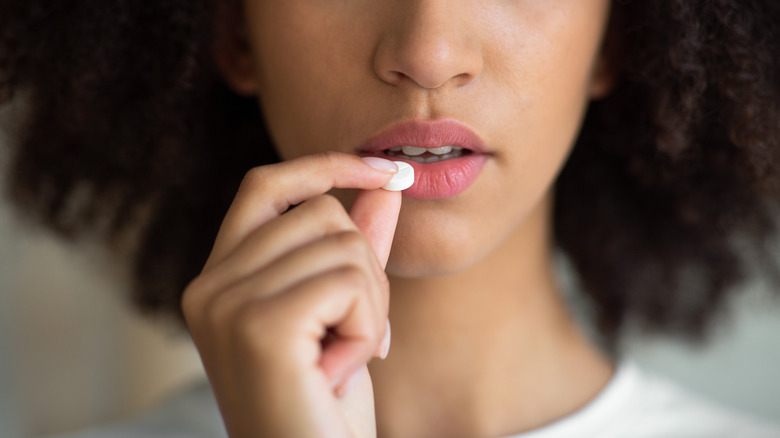The Side Effects You Might Experience If You Take Lexapro
Just over 100 years ago, Major Depressive Disorder (MDD) was known by a different name: "melancholia." As Sigmund Freud, the father of psychoanalysis, argued in his 1917 essay, "Mourning and Melancholia," "The distinguishing mental features of melancholia are profoundly painful dejection, cessation of interest in the outside world, loss of the capacity to love, inhibition of all activity, and a lowering of self-regarding feelings."
Although modern doctors have taken issue with many of Freud's 20th-century conclusions — he's perhaps most infamous for the "Oedipus complex" theory — the outline of depression symptoms as defined in "Mourning and Melancholia" hasn't changed all that much since 1917. However, the treatment has evolved considerably with two main drug classes emerging in the 50 years since antidepressant medications were first prescribed.
Selective serotonin reuptake inhibitors (SSRIs) and selective norepinephrine reuptake inhibitors (SNRIs), per the Mayo Clinic, are the most common. Lexapro, which was commercially launched in 2002 according to Clinical Trials Arena, falls into the former category. As an SSRI, this drug works by managing the amount of serotonin in the brain, ensuring that less of it is recycled at a time (and therefore aiding in mood regulation).
However, despite the incredible improvement in the variety of available antidepressants on the market, you can still expect to experience side effects from any drug you take — including Lexapro.
Lexapro can lead to nausea, dizziness, and headaches
As an SSRI, Lexapro — also known under the generic name, Escitalopram — can be used to treat both depression and anxiety (via the Mayo Clinic). Though not everyone will suffer side effects when taking Lexapro, it's not uncommon to experience nausea, headaches, dry mouth, and dizziness, per the National Alliance of Mental Illness. More specifically, 18% of those taking Lexapro during clinical studies felt some form of nausea (via GoodRx Health).
Keep in mind that physical discomforts may dissipate after a few weeks as your body adjusts to the medication. However, it's important to speak with your medical provider if symptoms persist. Because SSRIs have different potencies, according to the National Alliance of Mental Illness, a different brand may lessen (or heighten) uncomfortable side effects. Fortunately, feelings of nausea can be managed by taking your medication during mealtimes or right before bed. It may take a while to figure out what works best for you.
It's important to note, too, that Lexapro should be taken at the same time every day, per the NHS. For instance, swallow your medication with a morning glass of water if you start to experience insomnia or trouble sleeping, a side effect experienced by approximately 12% of clinical trial participants, per GoodRx Health. Although rare, some patients also deal with increased suicidal thoughts (especially if they're under 25 years old). If you notice a worsening in your depressive symptoms, contact your doctor immediately.
Sexual side effects are not uncommon while taking Lexapro
Elsewhere, sexual side effects such as decreased libido, erectile dysfunction, or trouble reaching orgasm can all occur while taking Lexapro (via GoodRx Health). Though the cause of this is still largely unknown, it's thought that the increased levels of serotonin resulting from SSRIs can impact testosterone and dopamine production, per Hers. If this is true for you, speaking with your mental health practitioner or even your romantic partner when depressed may prove beneficial.
As noted by Harvard Health Publishing, sexual dysfunction could also be a symptom of untreated depression itself — 35% to 50% of people with Major Depressive Disorder experience sexual side effects. So, it might not be your medication. As is the case with nausea and headaches, sexual side effects can sometimes dissipate over time as your body adjusts to Lexapro. Lowering dosage or changing the time you take your medication can also help alleviate symptoms as well.
Ultimately, what really happens to your body when you're depressed can be hard to predict, leading to everything from joint pain to brain fog. Although Lexapro isn't a one-stop cure-all for MDD or anxiety, it can turn your life around, particularly when combined with therapy. Keep in mind that a big part of recovery might entail deciding which side effects are worth it. It may take several tries, and discussions with your doctor, before determining which SSRI is best for you.


